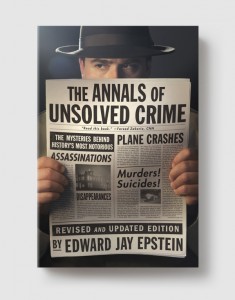March 15, 2013
The perils of confirmation bias
by Edward Jay Epstein
In writing my new book The Annals of Unsolved Crime, I learned that even the most well-intentioned investigations are vulnerable to what social scientists call “confirmation bias.” This phenomenon helps explains why criminal investigators tend more readily to accept evidence that confirms their initial working hypothesis and hold in abeyance evidence that undermines it. While nowadays neurosciences are actually able to observe such cognitive dissonance at work inside the brain with MRI scans, it has been long understood by philosophers.Francis Bacon summed it up eloquently four centuries ago when he wrote in Novum Organum that “The human understanding when it has once adopted an opinion . . . draws all things else to support and agree with it. And though there be a greater number and weight of instances to be found on the other side, yet these it either neglects or despises, or else by some distinction sets aside or rejects.” Such confirmation bias limits even the most exhaustive investigations backed by all the resources of a powerful government, as I found in my re-examinations of inquiries into the Anthrax attack on America, the Oklahoma City Bombing, and the JFK assassination.
It also accounts for why in my view some of history’s most intriguing mysteries remain unsolved.
Edward Jay Epstein's book The Annals of Unsolved Crime is available now from Melville House.
